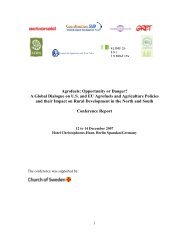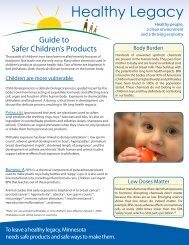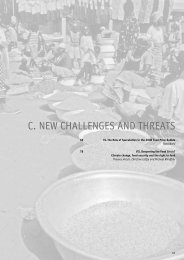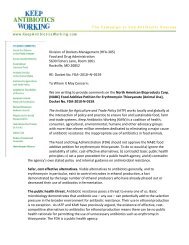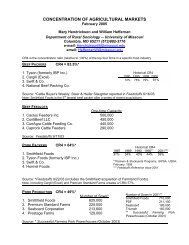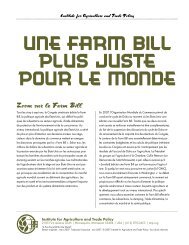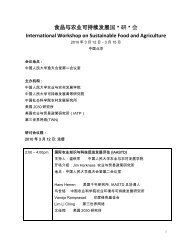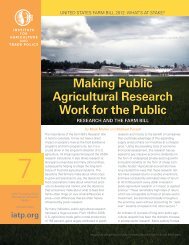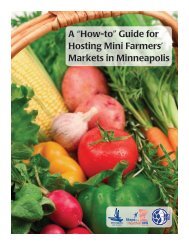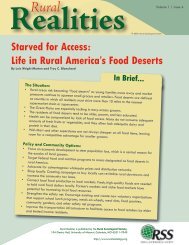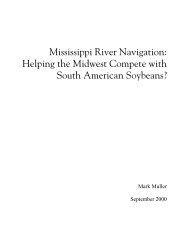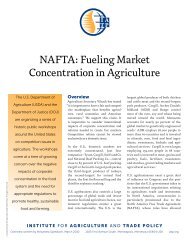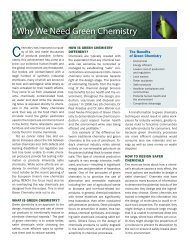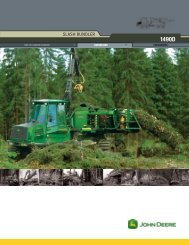IATP Hog Report - Institute for Agriculture and Trade Policy
IATP Hog Report - Institute for Agriculture and Trade Policy
IATP Hog Report - Institute for Agriculture and Trade Policy
You also want an ePaper? Increase the reach of your titles
YUMPU automatically turns print PDFs into web optimized ePapers that Google loves.
Section 8<br />
VIII. Funder to<br />
Funder<br />
Sub-sections:<br />
Our Perspective on the<br />
Role of Foundations<br />
What can private<br />
foundations do about the<br />
alarming issues raised in<br />
this report? Why should<br />
we care?<br />
But what can private<br />
foundations, specifically,<br />
do?<br />
Why should private<br />
foundations get involved<br />
with this issue, at this<br />
time?<br />
| Next Section |<br />
| Table of Contents |<br />
| Home Page |<br />
Funder to Funder<br />
Our Perspective on the Role of Foundations<br />
Intensive livestock operations or CAFO's (Confined Animal Feeding<br />
Operations) stick out like a sore thumb. Why? Because they are creating<br />
unprecedented <strong>and</strong> harmful effects on human health, animal health, water<br />
quality, <strong>and</strong> the economic sustainability of independent farmers. Some<br />
might say that nothing can get too big. Like the growing market<br />
dominance of gigantic corporations, the increasingly concentrated <strong>and</strong><br />
monopolistic ownership of our food system, <strong>and</strong> the vast network of multinational<br />
timber, mining, oil <strong>and</strong> gas companies, CAFOs are another<br />
example of what can go wrong when the scale of operations becomes too<br />
big. The result is business that is too big, unsustainable <strong>and</strong> in the<br />
unending pursuit of profits, disrespectful of creatures, people <strong>and</strong><br />
communities. Un<strong>for</strong>tunately, CAFOs are not an isolated issue but related<br />
to the globalization of our economy. To us then, this report is not antibusiness<br />
but anti- "too big" business.<br />
Like it or not, this report confronts us with the profound changes that have<br />
occurred since WWII in the way our food is produced. Over time, the<br />
evidence of the measurable effects of "modern" agricultural practices on<br />
human health, the environment, <strong>and</strong> the sustainability of rural economies<br />
is mounting. This report focuses on one facet of the "path of<br />
industrialization" that agriculture has followed during the past 30 - 40<br />
years: the emergence of large-scale, capital-intensive "factory farms" <strong>for</strong><br />
the cultivation of beef, hogs, turkeys, <strong>and</strong> chickens <strong>for</strong> human<br />
consumption.<br />
Let's face it: most of us see the world through our consumer eyes <strong>and</strong><br />
know only the bright side of US agriculture: the post-war growth in our<br />
productive capacity; the comparatively low cost (so we're told) of food;<br />
the appearance of high quality of our food products; the breadbasket <strong>for</strong><br />
the world. The problems with CAFOs are parallel to those associated with<br />
concentrated crop production: monoculture growing, fence row to fence<br />
row planting, increased reliance on fossil fuel based inputs, non-point<br />
source pollution, monopolistic markets, <strong>and</strong> food products with chemical<br />
residues. Our agriculture <strong>and</strong> food systems are now based on the industrial<br />
model of production rather than ecological principles. "Too big"<br />
agriculture reveals the mistaken belief that more technology will fix the<br />
problems that have been caused by technology. Our current food<br />
production system, <strong>and</strong> CAFOs in particular, make us ask just how far<br />
from nature do we think we can bend natural systems without breaking<br />
them?<br />
http://www.iatp.org/hogreport/sec8.html (1 of 3)2/27/2006 3:50:18 AM



